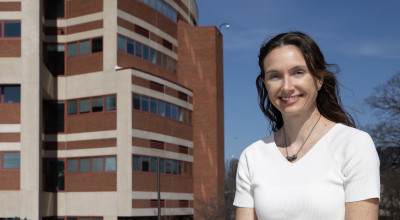Amid the growing risk of cyber threats, there is a crucial need to provide the next generation of leaders with the skills to address these challenges. The Georgia Tech Research Institute (GTRI) has played a key role in this effort by bringing CyberStart America – a free online cybersecurity competition that helps high school students discover their talent in cybersecurity – to more Georgia schools.
GTRI recently teamed up with the University of North Georgia, the Georgia Cyber Center and the Georgia Department of Education to promote CyberStart within the state.
For the latest cycle of CyberStart that ran from October 2021 to April 2022, Georgia led the nation in participants, with 6,383 students from 274 Georgia high schools competing. That represents a whopping 564% increase in Georgia student participation compared to the previous cycle. A total of 45,962 students competed nationwide.
CyberStart is an online game designed to help students learn about cyber topics as they complete fun puzzles and challenges. The game allows students to take on the role of cyber protection agents as they solve cybersecurity-related puzzles and gain exposure to code breaking, programming, networking and digital forensics.
Students can play the games at their own pace and all students in grades 9-12 are able to participate.
In addition to building their cyber skills, students also have the opportunity to compete for scholarships and cash prizes.
Jim Crupi, a UNG board of trustees member and President of Strategic Leadership Solutions who helped raise private funds for student and school prizes, said CyberStart is unique because it exposes students from diverse backgrounds to crucial cyber concepts. It also gives them an opportunity to earn SANS training and certification that companies and universities "cherish" while helping them develop skills that will pay dividends throughout their entire career.
SANS is a professional cybersecurity training organization that trains more than 40,000 cybersecurity technologists each year.
"The greatest threat to our economy is cybersecurity," Crupi said. "Our kids may represent 25% of our population, but they represent 100% of our future. The gamified format of CyberStart teaches students problem solving and critical thinking skills, which are in high demand. There is an intrinsic value to playing this game even if you don't go into cybersecurity."
The CyberStart America in Georgia taskforce gave out $102,497 in cash prizes to top performing students, schools and districts during the 2021-2022 competition season.
"There's a real need for talented cybersecurity professionals in Georgia," said Tyler Kinner, a GTRI research scientist who is a part of the CyberStart America in Georgia taskforce. "Not only will this program help address the future cyber workforce shortage, but it will also help students become savvier in terms of how they interact with technology."
There are over 75 cybersecurity companies in Georgia that generate an estimated $2.6 billion annually, according to recent estimates. Georgia ranked in the top seven states for cybersecurity growth potential by Business Facilities Magazine in 2021.
Additionally, there are 700,000 cyber job openings nationally, with about 25,000 of those in Georgia.
GTRI led the development of a standards matrix to communicate the alignment between CyberStart and the Georgia Department of Education's curriculum requirements for Georgia high school students. Since its first use during the 2021-2022 school year, other states’ CyberStart America working groups have followed in developing their own standards-based matrix for this year’s competition season.
"We went through CyberStart to document what knowledge and skills students were learning, and used this to develop a matrix where we demonstrated the alignment between CyberStart and the course standards for Georgia’s cybersecurity pathway courses,” Kinner explained. "That way, we could communicate to teachers and leaders, 'Here's this acclaimed international platform, and here’s how it aligns to our state's standards.'"
Kinner noted that the gamified format of CyberStart has helped spur record participation in the program, and he is optimistic that the Georgia participation numbers for the 2022-2023 academic year will be even higher than last year.
"I think CyberStart has hit a sweet spot in terms of figuring out how to engage high school students with a format that is both educational and entertaining," Kinner said.
Writer: Anna Akins (anna.akins@gtri.gatech.edu)
Photo Credit: University of North Georgia
GTRI Communications
Georgia Tech Research Institute
Atlanta, Georgia USA
MORE 2022 ANNUAL REPORT STORIES
MORE GTRI NEWS STORIES
The Georgia Tech Research Institute (GTRI) is the nonprofit, applied research division of the Georgia Institute of Technology (Georgia Tech). Founded in 1934 as the Engineering Experiment Station, GTRI has grown to more than 2,800 employees supporting eight laboratories in over 20 locations around the country and performing more than $700 million of problem-solving research annually for government and industry. GTRI's renowned researchers combine science, engineering, economics, policy, and technical expertise to solve complex problems for the U.S. federal government, state, and industry.





